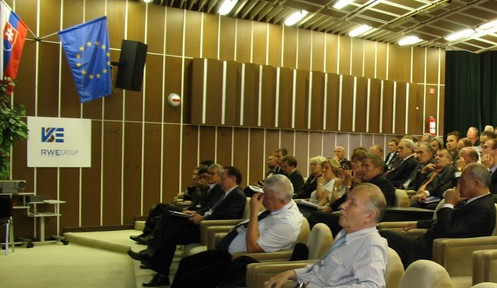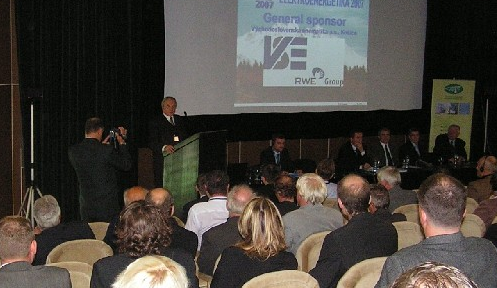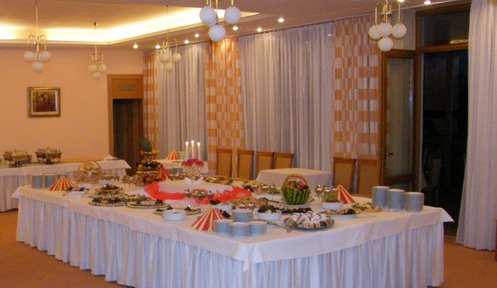Call for Papers Announcement
We call for papers that address theoretical, experimental, systems-related and power network management issues in the area of electricity production, marketing and management of distributed sources of electricity; dependability and survivability of power networks; smart grids and end-systems; maintenance, diagnostics and infrastructure.
Authors are called to submit their annotations which will be reviewed. Acceptation/decline status of the proposal will be sent by email to corresponding author. Accepted proposals are followed by paper submisstions, review rounds and final proceedings publication. Submissions are peer reviewed, with final decision made by symposium directors. Accepted papers are identified as "peer-reviewed conference papers."
Topics of interest include, but are not limited, to the following areas.
The symposium topics
- Generation of Electricity, Transmission, Distribution and Consumption of Electricity.
- High Voltage Technique and Diagnostics in Power Engineering.
- Power Systems Relaying, Faults Analysis.
- Power System Control, Liberalisation of Electricity Market.
- Smart Grids, Electromobility.
How to contribute to ELEKTROENERGETIKA SYMPOSIUM program
1. You can submit your theme proposal and detailed annotation. The theme acceptance/rejection will be sent to you by email.
2. The paper should contain more than 4 pages and it cannot exceed 6 pages. The references list has to follow IEEE Citation Style Guide.
Prepare and submit full paper. One paper per one registration. The papers are peer-reviewed. The paper acceptation/rejection will be sent to you. Accepted papers are considered as reviewed conference publication.
3. Finaly you are invited to present your work from public floor.
Theme proposal and annotation
ANNOTATION PREPARATION INSTRUCTIONS
A concise and factual annotation is required. It should state briefly the purpose of the research, the principal results and major conclusions. An annotation should be able to be presented alone, separately from the article. References,
non-standard or uncommon abbreviations should be avoided.
The annotation will be used by the Scientific Committee as the sole basis for acceptance of the paper for presentation. Thus, the annotation should clearly communicate the new and significant results that have been obtained. Time and effort spent constructing a clear, concise, and well-written annotation will maximize the chance of paper acceptance.
Annotation should clearly state:
The purpose of the research
The principal results and accomplishments and their significance
The major conclusions
Questions regarding annotation preparation should be forwarded to symposium email (see Contact).
ELEKTROENERGETIKA paper draw up
Languages
Indexing
- PROCEEDINGS OF THE 10TH INTERNATIONAL SCIENTIFIC SYMPOSIUM ON ELECTRICAL POWER ENGINEERING - ELEKTROENERGETIKA 2017
- PROCEEDINGS OF THE 9TH INTERNATIONAL SCIENTIFIC SYMPOSIUM ON ELECTRICAL POWER ENGINEERING - ELEKTROENERGETIKA 2017
- PROCEEDINGS OF THE 8TH INTERNATIONAL SCIENTIFIC SYMPOSIUM ON ELECTRICAL POWER ENGINEERING - ELEKTROENERGETIKA 2015
- PROCEEDINGS OF THE 7TH INTERNATIONAL SCIENTIFIC SYMPOSIUM ON ELECTRICAL POWER ENGINEERING - ELEKTROENERGETIKA 2013
- PROCEEDINGS OF THE 6TH INTERNATIONAL SCIENTIFIC SYMPOSIUM ON ELECTRICAL POWER ENGINEERING - ELEKTROENERGETIKA 2011
- PROCEEDINGS OF THE 5TH INTERNATIONAL SCIENTIFIC SYMPOSIUM ON ELECTRIC POWER ENGINEERING - ELEKTROENERGETIKA 2009
- PROCEEDINGS OF THE IVTH INTERNATIONAL SCIENTIFIC SYMPOSIUM ON ELECTRIC POWER ENGINEERING - ELEKTROENERGETIKA 2007
Publication Ethics and Publication Malpractice Statement
Our ethic statements are based on COPE’s Best Practice Guidelines for Journal Editors.
Publication decisions
The editor is responsible for deciding which of the articles submitted to the procceedings should be published.
The editor may be guided by the policies of the proceedings editorial board and constrained by such legal requirements as shall then be in force regarding libel, copyright infringement and plagiarism. The editor may confer with other editors or reviewers in making this decision.
Fair play
An editor at any time evaluate manuscripts for their intellectual content without regard to race, gender, sexual orientation, religious belief, ethnic origin, citizenship, or political philosophy of the authors.
Confidentiality
The editor and any editorial staff must not disclose any information about a submitted manuscript to anyone other than the corresponding author, reviewers, potential reviewers, other editorial advisers, and the publisher, as appropriate.
Disclosure and conflicts of interest
Unpublished materials disclosed in a submitted manuscript must not be used in an editor's own research without the express written consent of the author.
Duties of Reviewers
Contribution to Editorial Decisions
Peer review assists the editor in making editorial decisions and through the editorial communications with the author may also assist the author in improving the paper.
Promptness
Any selected referee who feels unqualified to review the research reported in a manuscript or knows that its prompt review will be impossible should notify the editor and excuse himself from the review process.
Confidentiality
Any manuscripts received for review must be treated as confidential documents. They must not be shown to or discussed with others except as authorized by the editor.
Standards of Objectivity
Reviews should be conducted objectively. Personal criticism of the author is inappropriate. Referees should express their views clearly with supporting arguments.
Acknowledgement of Sources
Reviewers should identify relevant published work that has not been cited by the authors. Any statement that an observation, derivation, or argument had been previously reported should be accompanied by the relevant citation. A reviewer should also call to the editor's attention any substantial similarity or overlap between the manuscript under consideration and any other published paper of which they have personal knowledge.
Disclosure and Conflict of Interest
Privileged information or ideas obtained through peer review must be kept confidential and not used for personal advantage. Reviewers should not consider manuscripts in which they have conflicts of interest resulting from competitive, collaborative, or other relationships or connections with any of the authors, companies, or institutions connected to the papers.
Duties of Authors
Reporting standards
Authors of reports of original research should present an accurate account of the work performed as well as an objective discussion of its significance. Underlying data should be represented accurately in the paper. A paper should contain sufficient detail and references to permit others to replicate the work. Fraudulent or knowingly inaccurate statements constitute unethical behavior and are unacceptable.
Originality and Plagiarism
The authors should ensure that they have written entirely original works, and if the authors have used the work and/or words of others that this has been appropriately cited or quoted.
Multiple, Redundant or Concurrent Publication
An author should not in general publish manuscripts describing essentially the same research in more than one journal or primary publication. Submitting the same manuscript to more than one journal or primary publication concurrently constitutes unethical publishing behaviour and is unacceptable.
Acknowledgement of Sources
Proper acknowledgment of the work of others must always be given. Authors should cite publications that have been influential in determining the nature of the reported work.
Authorship of the Paper
Authorship should be limited to those who have made a significant contribution to the conception, design, execution, or interpretation of the reported study. All those who have made significant contributions should be listed as co-authors. Where there are others who have participated in certain substantive aspects of the research project, they should be acknowledged or listed as contributors.
The corresponding author should ensure that all appropriate co-authors and no inappropriate co-authors are included on the paper, and that all co-authors have seen and approved the final version of the paper and have agreed to its submission for publication.
Disclosure and Conflicts of Interest
All authors should disclose in their manuscript any financial or other substantive conflict of interest that might be construed to influence the results or interpretation of their manuscript. All sources of financial support for the project should be disclosed.
Fundamental errors in published works
When an author discovers a significant error or inaccuracy in his/her own published work, it is the author’s obligation to promptly notify the proceedings editor or publisher and cooperate with the editor to retract or correct the paper.
Annotation Deadline: 31. 03. 2022
Paper Deadline: 31. 03. 2022
This symposium enables participants to submit annotations online at https://eesymp.fei.tuke.sk/submit.php.
Contribution can include:







